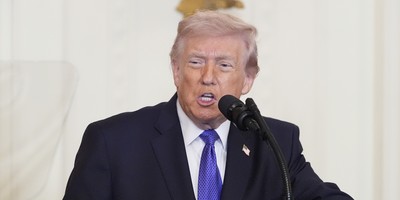It didn't work. Guantanamo remains open. Changing the name didn't change the fact of the war on terror. American troops will remain in Iraq and Afghanistan for a long time. Iran has become even more belligerent, and so forth. Has experience affected the administration's approach?
The theme of that first year -- besides Bushophobia -- was that American arrogance, unilateralism, insensitivity to other cultures and peoples, and resorting to military force were what ailed the world. That, and the lack of a solution to the Palestinian problem. If you'd asked any of the president's major foreign policy advisers in 2008 what was roiling world capitals, you would probably have heard some version of the American arrogance/Israeli intransigence theme. Accordingly, American deference, modesty, respect for others, and above all, willingness to shun leadership in favor of subordination into international bodies, would serve both America's image and her interests.
If nothing else, the uprisings in the Muslim world have thrown this narrative into turmoil, demonstrating as they do a continuing world hunger for American moral leadership. In the streets of Tehran in the spring of 2009, demonstrators flung a rebuke at Obama's diffidence (he had declined to condemn the regime that was shooting peaceful demonstrators), chanting "Obama! Obama! You're either with us or you're with them." Since the Iranian regime was implacably hostile to the U.S., and because Obama had invested time and prestige in the pursuit of better relations, he resisted siding with the demonstrators -- though the moral and geopolitical case for doing so could not have been stronger.
Recommended
The demonstrators in Egypt and Tunisia, on the other hand, were arrayed against leaders friendly to the United States. After a brief pause, they received Obama's blessing (deeply alienating the Saudis, which is a problem for another day). Why? Were Ben Ali and Hosni Mubarak less legitimate than Khamenei and Ahmadinejad? Arguably, they were more legitimate -- certainly they were less brutal, if no less corrupt. Why the different standard?
Now the Syrians have taken to the streets in their thousands. Again, the regime is a terror-sponsoring, American-killing (Syria helped ferry terrorists into Iraq), Lebanon-undermining thugocracy -- Iran's one friend and ally in the Arab world. Obama had declared that Mubarak had to go. He has not said the same about Bashar Assad.
One almost has the sense that Obama resents the people of Iran and Syria for complicating his outreach efforts. How embarrassing that the streets should be thronged with demonstrators asking for freedom when Obama was going to strike deals with those very withholders of freedom. (The U.S. had just dispatched an ambassador to Damascus for the first time in six years.) How awkward that the people in the streets are not expressing frustration at the lack of progress on Israeli/Palestinian peace but instead outrage at the repression, brutality, and lack of opportunity in their own societies.
All of the American modesty in the world cannot correct that. Quite the opposite -- our unwillingness to take the side of liberty against monstrous regimes increases the sum total of oppression in the world.
Only in the case of Libya has the Obama administration acted decisively against an American antagonist. In that case, the president was able to follow the lead of others (the U.N., Britain, and France) and convince himself that he was averting genocide. He may have been. And there's nothing illegitimate in acting to prevent genocide. What's inexplicable is Obama's resistance to the truth about other thugs in the world. Gadhafi is a vicious killer. On the strength of that knowledge, Obama was able to join a coalition against him (though not to finish the job).
Yet the world is well stocked with Gadhafis. Most of them are fanatical enemies of the United States. The people in the streets of the Muslim world proclaim that it is they, not we, who most need to change. This was not at all the way things were supposed to go, when Barack Obama steered his new course.

























Join the conversation as a VIP Member